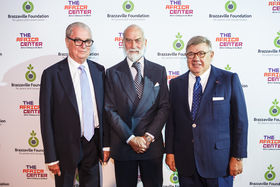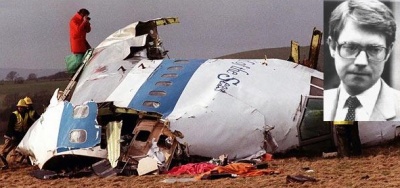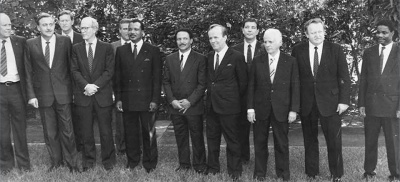Difference between revisions of "Brazzaville Foundation"
(Referencing) |
(Adding images) |
||
| Line 1: | Line 1: | ||
[[File:Brazzaville_Foundation.jpg|280px|right|thumb|TBF patron HRH Prince Michael of Kent with Lord Bell and [[Jean-Yves Ollivier]] ]] | [[File:Brazzaville_Foundation.jpg|280px|right|thumb|TBF patron HRH Prince Michael of Kent with Lord Bell and [[Jean-Yves Ollivier]] ]] | ||
| − | '''The Brazzaville Foundation''' (TBF) is a UK-registered charity | + | '''The Brazzaville Foundation''' (TBF) is a UK-registered charity founded by Congolese president [http://en.wikipedia.org/wiki/Denis_Sassou_Nguesso Denis Sassou Nguesso], patron is [http://en.wikipedia.org/wiki/Prince_Michael_of_Kent HRH Prince Michael of Kent] and two-man board of trustees are [http://www.telegraph.co.uk/news/politics/margaret-thatcher/11309863/Tim-Bell-my-sort-of-horrible-Christmases-at-Chequers-with-Margaret-Thatcher.html Lord Bell of Belgravia] and French secret agent [[Jean-Yves Ollivier]].<ref>[http://www.brazzavillefoundation.org/en/about-us/ "The Brazzaville Foundation"]</ref> |
| − | + | TBF believes that only by achieving lasting peace and stability can nations thrive, people prosper and the environment be safeguarded. | |
| − | TBF | + | The Brazzaville Foundation therefore exists to promote peace and stability by facilitating dispute settlement and encouraging dialogue both high level and grass-roots, for the benefit of all. The Foundation is independent, impartial and discreet. The Foundation’s work is conducted on a non-profit basis by distinguished individuals of the highest integrity and achievement.<ref>[http://www.brazzavillefoundation.org/en/what-we-do/ "What We Do"]</ref> |
| − | + | The Foundation draws its authority to act on appeals from States afflicted by internal conflict, those with conflicts on their borders, and through regional or multi-national institutions seeking mediation support. TBF’s work will be judged on the ensuing peace dividend, through the fostering of political and social stability, through the creation of jobs, prosperity and empowerment of affected citizens.<ref>[http://www.brazzavillefoundation.org/en/get-in-touch/ "Get in touch"]</ref> | |
| − | + | ==Spirit of Brazzaville== | |
| + | TBF was launched a quarter century after the [[Brazzaville Protocol]], which ended the Cold War in Africa almost a year before the Berlin Wall crumbled and brought not only peace to Southern Africa but also opened the door for the release of [[Nelson Mandela]], and for a negotiated end of apartheid and the advent of the ‘rainbow nation’. TBF keeps the ‘spirit of Brazzaville’ alive through the combination of bold statesmanship and ‘citizen diplomacy’. | ||
| − | + | TBF's patron is HRH Prince Michael of Kent, who is seconded by a high-powered Board of Trustees composed of eminent personalities, business as well as political leaders and dignitaries from a wide range of civil society organisations. Its Chairman, and one of its trustees, is [[Jean-Yves Ollivier]], a French businessman who has been engaged in conflict resolution in Africa for more than thirty years. His behind-the-scenes diplomacy was instrumental to the conclusion of the [[Brazzaville Protocol]]. | |
| − | == | + | ==Preliminary agreement== |
| − | + | [[File:Brazzaville_Protocol.jpg|400px|right|thumb|[[Brazzaville Protocol|Participants at Namibia's independence negotiations in the Congolese capital Brazzaville]], 13 December 1988]] | |
| + | The [[Brazzaville Protocol]] of 13 December 1988 was a momentous event in the history of modern Africa. This preliminary agreement was the culmination of years of behind-the-scenes negotiations aimed at bringing about the end of apartheid and white-only rule in [[South Africa]]. | ||
| − | + | Initialling the protocol preceded the formal signing by representatives of Angola, Cuba and apartheid [[South Africa]] of the [[New York Accords]] at UN headquarters, which would be the cornerstone in the creation of modern [[South Africa]], finalising the process of political emancipation for millions of [[South Africa]]ns.<ref>[http://peacemaker.un.org/angola-protocole-brazzaville88 "Protocol of Brazzaville"]</ref> | |
| − | |||
| − | + | Participants at the [[Brazzaville Protocol|Brazzaville negotiations]] included [[South Africa]]n Defence Minister [[Magnus Malan]], Foreign Minister [[Pik Botha]], Head of Military Intelligence [[General van Tonder]], US Assistant Secretary of State for African Affairs [[Chester Crocker]], French secret agent [[Jean-Yves Ollivier]] and [http://en.wikipedia.org/wiki/Finland Finland]'s [[Martti Ahtisaari]]. | |
| − | == | + | ==Absentee at the signing== |
| − | + | [[File:Carlsson_Pan_Am_103.jpg|400px|right|thumb|[[United Nations]] Commissioner for Namibia [[Bernt Carlsson]], the prime target on [[Pan Am Flight 103]], 21 December 1988]] | |
| − | The Brazzaville | + | The [[New York Accords]], giving effect to the [[Brazzaville Protocol]], were scheduled to be signed the following week at UN headquarters in New York on Thursday 22 December 1988.<ref>[http://www.usip.org/library/pa/angola/angola_cuba_sa_12221988.html "Agreement Among the Peoples Republic of Angola, the Republic of Cuba, and the Republic of South Africa"]</ref> [[United Nations]] Assistant Secretary-General and UN Commissioner for Namibia, [[Bernt Carlsson]], who would have assumed control of the country until [[Namibia]]'s first universal franchise elections had been held, was unable to attend the signing ceremony, being one of 259 passengers and crew killed when [[Pan Am Flight 103]] crashed at Lockerbie on 21 December 1988.<ref>[http://query.nytimes.com/gst/fullpage.html?res=940DE4D9143EF931A15751C1A96E948260 "U.N. Officer on Flight 103"] ''The New York Times'' December 22, 1988</ref> Following the UN Commissioner's death at Lockerbie, South African foreign minister [[Pik Botha]] went ahead and signed the [[Tripartite Accord]] on 22 December 1988. However, instead of handing control of [[Namibia]] to the [[United Nations]], [[Pik Botha]] put the apartheid regime's Administrator-General, [[Louis Pienaar]], in charge. No investigation by the Scottish Police, the [[CIA]], the [[FBI]] or the [[United Nations]] has ever been conducted into the evident targeting of [[Bernt Carlsson]] on [[Pan Am Flight 103]], despite the branding of apartheid [[South Africa]] as a "terrorist state" by [[Michael Dukakis#Drafting the platform|Governor Michael Dukakis]], Democratic nominee in the 1988 US presidential election campaign.<ref>[http://www.nytimes.com/1988/06/13/us/dukakis-backers-agree-platform-will-call-south-africa-terrorist.html "Dukakis Backers Agree Platform Will Call South Africa 'Terrorist'"]</ref> |
==References== | ==References== | ||
<references/> | <references/> | ||
Revision as of 21:28, 18 March 2015

The Brazzaville Foundation (TBF) is a UK-registered charity founded by Congolese president Denis Sassou Nguesso, patron is HRH Prince Michael of Kent and two-man board of trustees are Lord Bell of Belgravia and French secret agent Jean-Yves Ollivier.[1]
TBF believes that only by achieving lasting peace and stability can nations thrive, people prosper and the environment be safeguarded. The Brazzaville Foundation therefore exists to promote peace and stability by facilitating dispute settlement and encouraging dialogue both high level and grass-roots, for the benefit of all. The Foundation is independent, impartial and discreet. The Foundation’s work is conducted on a non-profit basis by distinguished individuals of the highest integrity and achievement.[2]
The Foundation draws its authority to act on appeals from States afflicted by internal conflict, those with conflicts on their borders, and through regional or multi-national institutions seeking mediation support. TBF’s work will be judged on the ensuing peace dividend, through the fostering of political and social stability, through the creation of jobs, prosperity and empowerment of affected citizens.[3]
Spirit of Brazzaville
TBF was launched a quarter century after the Brazzaville Protocol, which ended the Cold War in Africa almost a year before the Berlin Wall crumbled and brought not only peace to Southern Africa but also opened the door for the release of Nelson Mandela, and for a negotiated end of apartheid and the advent of the ‘rainbow nation’. TBF keeps the ‘spirit of Brazzaville’ alive through the combination of bold statesmanship and ‘citizen diplomacy’.
TBF's patron is HRH Prince Michael of Kent, who is seconded by a high-powered Board of Trustees composed of eminent personalities, business as well as political leaders and dignitaries from a wide range of civil society organisations. Its Chairman, and one of its trustees, is Jean-Yves Ollivier, a French businessman who has been engaged in conflict resolution in Africa for more than thirty years. His behind-the-scenes diplomacy was instrumental to the conclusion of the Brazzaville Protocol.
Preliminary agreement
The Brazzaville Protocol of 13 December 1988 was a momentous event in the history of modern Africa. This preliminary agreement was the culmination of years of behind-the-scenes negotiations aimed at bringing about the end of apartheid and white-only rule in South Africa.
Initialling the protocol preceded the formal signing by representatives of Angola, Cuba and apartheid South Africa of the New York Accords at UN headquarters, which would be the cornerstone in the creation of modern South Africa, finalising the process of political emancipation for millions of South Africans.[4]
Participants at the Brazzaville negotiations included South African Defence Minister Magnus Malan, Foreign Minister Pik Botha, Head of Military Intelligence General van Tonder, US Assistant Secretary of State for African Affairs Chester Crocker, French secret agent Jean-Yves Ollivier and Finland's Martti Ahtisaari.
Absentee at the signing

The New York Accords, giving effect to the Brazzaville Protocol, were scheduled to be signed the following week at UN headquarters in New York on Thursday 22 December 1988.[5] United Nations Assistant Secretary-General and UN Commissioner for Namibia, Bernt Carlsson, who would have assumed control of the country until Namibia's first universal franchise elections had been held, was unable to attend the signing ceremony, being one of 259 passengers and crew killed when Pan Am Flight 103 crashed at Lockerbie on 21 December 1988.[6] Following the UN Commissioner's death at Lockerbie, South African foreign minister Pik Botha went ahead and signed the Tripartite Accord on 22 December 1988. However, instead of handing control of Namibia to the United Nations, Pik Botha put the apartheid regime's Administrator-General, Louis Pienaar, in charge. No investigation by the Scottish Police, the CIA, the FBI or the United Nations has ever been conducted into the evident targeting of Bernt Carlsson on Pan Am Flight 103, despite the branding of apartheid South Africa as a "terrorist state" by Governor Michael Dukakis, Democratic nominee in the 1988 US presidential election campaign.[7]
References
- ↑ "The Brazzaville Foundation"
- ↑ "What We Do"
- ↑ "Get in touch"
- ↑ "Protocol of Brazzaville"
- ↑ "Agreement Among the Peoples Republic of Angola, the Republic of Cuba, and the Republic of South Africa"
- ↑ "U.N. Officer on Flight 103" The New York Times December 22, 1988
- ↑ "Dukakis Backers Agree Platform Will Call South Africa 'Terrorist'"
